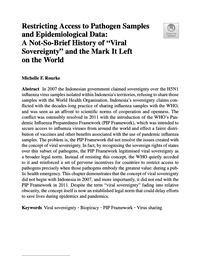Restricting Access to Pathogen Samples and Epidemiological Data: A Not-So-Brief History of “Viral Sovereignty” and the Mark It Left on the World
[Restricting Access to Pathogen Samples]
This chapter argues that the PIP Framework legitimized viral sovereignty as a broader legal norm, which cold delay life-saving efforts during epidemics and pandemics. They urge the international community to consider solutions that will facilitate the sharing of virus samples.
SUMMARY
This article by Michelle F. Rourke critically analyzes the history of “viral sovereignty.” Viral sovereignty is the concept that virus samples isolated from within a state’s borders are the sovereign property of that state. Rourke argues that viral sovereignty as a concept did not begin with Indonesia’s 2007 decision to claim sovereignty over the H5N1 virus samples. Indonesia may have been the first nation to invoke the United Nation’s Convention on Biological Diversity (CBD) to claim sovereignty over virus samples, Rourke claims it was not the first country to deny the WHO access to influenza viruses.To resolve these issues, the WHO introduced the PIP framework, which encouraged the sharing of samples between countries. However, the author argues that the PIP Framework actually legitimized viral sovereignty as a legal norm by recognizing the sovereign rights of states over some pathogens. Rourke’s perspective may contradict traditional narratives since the term “sovereignty” has largely fallen out of use in the international biological community and the PIP Framework has received abundant praise.
This article may be useful for any one seeking to understand the PIP Framework’s impact on the international community. It was published in the 2020 in Infectious Diseases of the New Millenium. The author, Michelle F. Rourke, is a CSIRO Synthetic Biology Future Science Research Fellow at Griffith University’s Law Futures Centre where she researches the regulation of access to biological resources. She previously studied as a Fulbright Scholar at the O'Neill Institute for National and Global Health Law at Georgetown University, Washington D.C. This article is currently only available in English


..png)
